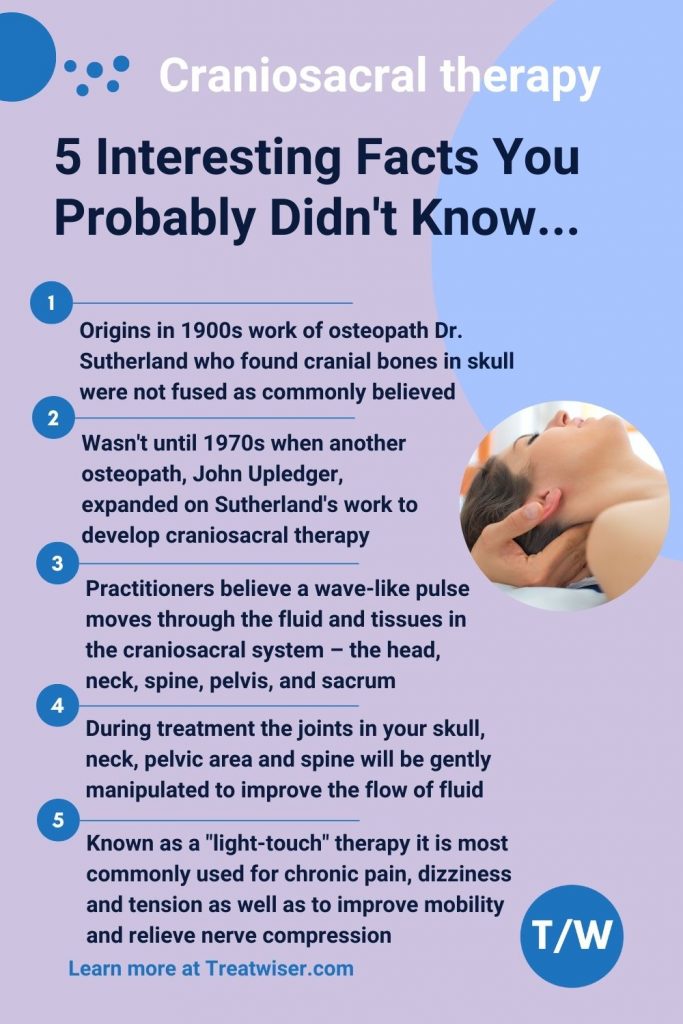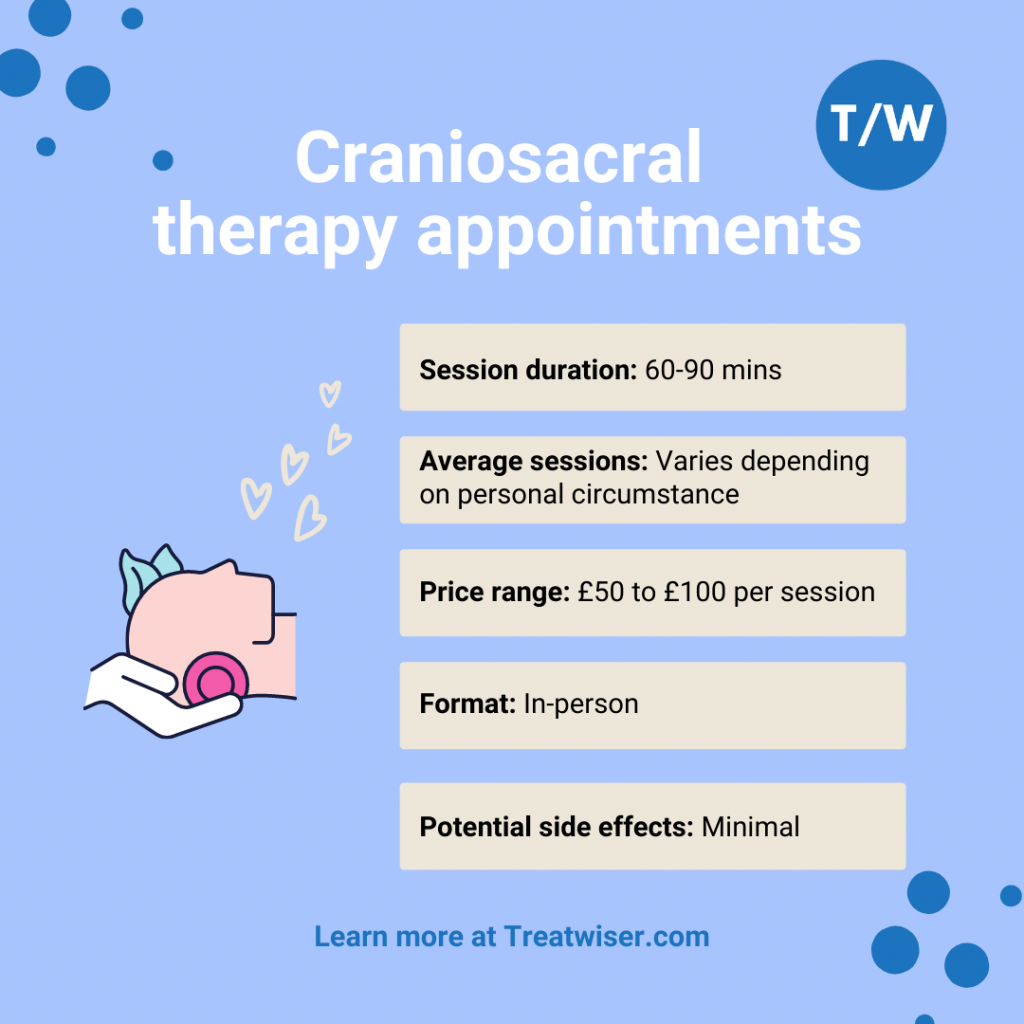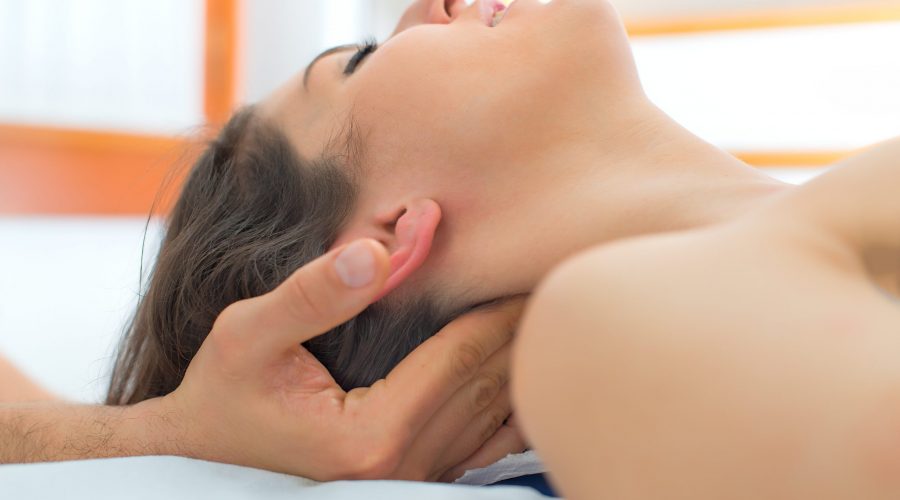Did you know there are fluids in and around your brain and spinal cord that nourish and protect your central nervous system? Unfortunately, emotional stress and trauma create tension in this area, restricting the flow of cerebrospinal fluid and affecting your body’s functioning. Craniosacral therapy is a holistic touch therapy that gently balances your nervous system and releases tension.
In this article, you’ll learn how craniosacral therapy works, who can benefit from this treatment, and what to expect during an appointment.
Table of contents
- 5 interesting facts about craniosacral therapy
- What is craniosacral therapy?
- What is the theory behind craniosacral therapy?
- What is craniosacral therapy used for?
- What is the evidence to support craniosacral therapy?
- What can I expect as a craniosacral therapy patient?
5 interesting facts about craniosacral therapy

What is craniosacral therapy?
Craniosacral therapy (or cranio therapy) is a hands-on form of bodywork that maintains and improves the health of your nervous system. It improves mobility and brings balance back to your body.
Practitioners gently manipulate and mobilise joints around your skull, neck, spine, and sacrum – a bone at the base of the spine. This stimulates the flow of cerebrospinal fluid and releases tension from the soft tissues and membrane around your nervous system.
Craniosacral therapy is safe, non-invasive, and helpful for preventing and relieving many physical and emotional symptoms.
The history of craniosacral therapy
Craniosacral therapy is partly based on cranial osteopathy which was developed in the early 1900s by the osteopath William Sutherland who was intrigued that the cranial bones in the skull are not fused as is commonly believed. In the 1970s, another osteopathic doctor, John Upledger, built on Dr Sutherland’s theory, going onto develop cranio therapy.
What is the theory behind cranio therapy?
Practitioners believe the craniosacral system has a wave-like rhythm or “pulse” that moves through the fluid and tissues in the craniosacral system – the head, neck, spine, pelvis, and sacrum. Chronic stress, injury, and illness disrupt the rhythm by creating tension in the membranes connecting the cranial and sacral areas.
Cranio therapy measures the subtle rate, symmetry, and quality of the craniosacral rhythm by gently palpating your bones and tissues. Practitioners work with these rhythms to restore balance to your system.
What is craniosacral therapy used for?
Craniosacral therapy is ideal for pain and tension. It improves mobility and helps relieve nerve compression in your head, neck, and spine.
The cranial therapist gently places their hands on various locations from your head and neck down to your lower spine to evaluate your craniosacral rhythm. Gentle manipulation techniques increase ease of movement in your craniosacral joints and tissues. However, the pressure is so light you may not even feel it!
Craniosacral therapy can treat a range of conditions
Cranio therapy releases nervous system tension, making it helpful for both mental and physical health conditions.
People commonly seek out Craniosacral therapy for the following reasons, however more research is required to support its efficacy, and you should always speak to your GP or qualified medical practitioner before booking any appointments:
- Headaches
- Back and neck injuries
- Scoliosis
- Chronic pain
- Circulation
- Hyperactivity
- Learning disabilities
- Colic
- Chronic fatigue
- Fibromyalgia
- Low immunity
- Constipation
- Irritable bowel syndrome
- Sinusitis
- Insomnia
- TMJ
- Burn out
- Anxiety and low mood
- Pelvic and back pain during pregnancy
Cranio therapy is also used for maintaining health and preventing pain, tension, and chronic health problems. However, cranio therapy isn’t intended to diagnose or cure any diseases. It’s a complementary therapy, not a replacement for conventional medical care.
Also note that craniosacral therapy is not to be confused with cranio osteopathy – more on the differences here.
Is craniosacral therapy safe for children?
Cranio therapy is safe and effective for newborns, toddlers, and older children1.
It’s so gentle that new parents feel comfortable using it on newborns to improve colic, breastfeeding, reflux, and sleep patterns. In older children, cranio therapy may be helpful for behavioural and learning problems.
What is the evidence to support craniosacral therapy?
Research supports the use of craniosacral therapy for improving quality of life and reducing chronic pain2, migraines3, fibromyalgia4, and asthma5. It also improves pain levels and mobility in those struggling with neck pain6.
A study on infants with colic found that craniosacral therapy reduced crying and improved sleep7.
What can I expect as a cranio therapy patient?
Cranio therapy is a hands-on practice that’s incredibly gentle and suitable for people of all ages. It doesn’t require you to remove any clothing – all you need to do is relax!
Let’s explore what you can expect at your first appointment.
The craniosacral therapy consultation
Your first appointment with a craniosacral therapist will last 60-90 minutes, allowing enough time for a thorough health history, discussion of your symptoms, and assessment.
You lie on your back on a therapy bed in a room with low lighting to help you relax. The practitioner will evaluate your craniosacral rhythm by lightly palpating your head, neck, spine, and sacrum and “listening” for the quality and flow of the pulse. Craniosacral therapists are intuitive and experienced with the body’s rhythms, movements, and sensations. Your body guides the treatment!
The joints in your skull, neck, pelvic area, and spine will be gently manipulated and mobilised to improve the flow of cerebrospinal fluid. They will also use subtle techniques to release tension in your fascia and tissues around your central nervous system. This is sometimes referred to as a craniosacral massage or cranial massage, however the pressure is barely noticeable.
Most people report feeling blissfully relaxed during a session, with a noticeable reduction in stress and tension. In some cases, you may become emotional. This is perfectly normal, and you can express your emotions freely to release tension.
At the end of the session, your therapist will give you a glass of water to help you flush out toxins. You may feel more tired on the day of treatment as your body adjusts, so take it easy and rest if possible.

How do I find a craniosacral therapy professional, and what qualifications should they have?
Craniosacral therapy isn’t regulated in the UK, so it’s crucial to check your practitioner has training and experience.
A qualified craniosacral therapist should be a member of a professional regulatory body such as The Craniosacral Therapy Association (CSTA) and The Complementary and Natural Healthcare Council (CNHC). These organisations aim to protect the public by ensuring practitioners are trained, insured, and follow a code of ethics.
On our Treatwiser directory, you can find craniosacral therapy near me and refine your search to check their qualifications. Many craniosacral therapists have other qualifications – like osteopathy, massage therapy, physiotherapy, chiropractic, acupuncture, naturopathy, and homeopathy.
How much will it cost?
Cranio therapy isn’t available on the NHS. An appointment may cost between £50 and £100 for 60-90 minutes.
How many appointments will I need?
The number of appointments you need depends on your symptoms and how quickly you respond to treatment.
Some people require just 1-2 sessions to see improvements, while others need 1-3 sessions weekly for several weeks if symptoms are long-standing. It’s also common to attend monthly maintenance sessions after your initial complaint resolves to keep your health in check. It may also be possible to perform craniosacral therapy on yourself from the comfort of you own home.
Do craniosacral therapy treatments hurt?
Cranio therapy is gentle and pain-free. There are no “clicking” or “cracking” manoeuvres common in chiropractic care.
You may experience pins and needles, tingling, or hot and cold sensations. This only means your lymphatic and circulatory systems are being stimulated.
What are the major risks associated with craniosacral therapy?
Cranio therapy is a safe practice with a low risk of side effects.
Resources and further craniosacral therapy information
- https://pubmed.ncbi.nlm.nih.gov/33647398
- https://pubmed.ncbi.nlm.nih.gov/31892357/
- https://www.ncbi.nlm.nih.gov/labs/pmc/articles/PMC3373391/
- https://pubmed.ncbi.nlm.nih.gov/19729492/
- https://pubmed.ncbi.nlm.nih.gov/17234566/
- https://pubmed.ncbi.nlm.nih.gov/26340656/
- https://pubmed.ncbi.nlm.nih.gov/31780018/
DISCLAIMER: The Site cannot and does not contain medical / health advice. The medical / health information is provided for general informational and educational purposes only and is not a substitute for professional advice. Accordingly, before seeking any form of medical advice, diagnoses or treatment based upon such information, we encourage you to consult with your GP or other qualified health practitioner. You must never disregard professional medical advice or delay in seeking it because of something mentioned on this Site. The use or reliance of any information contained on the Site is solely at your own risk.





